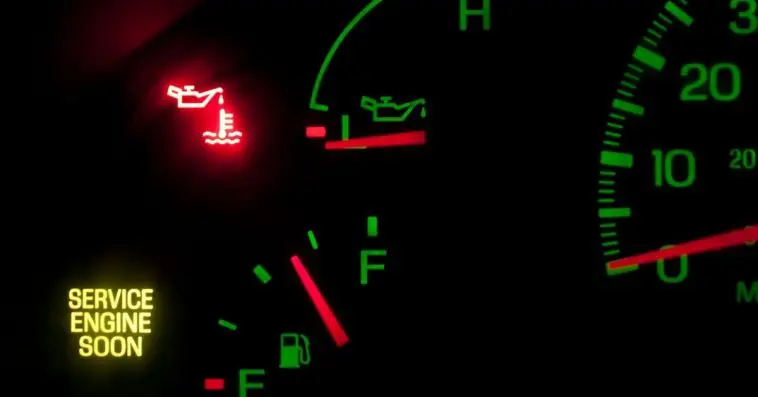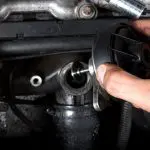A rise in the pressure of oil in your car is something to be dealt with immediately. Don’t ignore if you notice such a happening. Come to know the causes and go-ahead for a prompt solution.
There are five main causes of high oil pressure. Firstly, Any kind of blockade in oil passage. Secondly, a defective pressure relief valve. Thirdly, dirty oil filter. Fourthly, substandard quality of oil and lastly, a faulty fuel sending unit.
What does high oil pressure indicate?
It is an anticipatory sign as if something wrong is going to happen to your engine. It is a warning that the oil is not passing on to the parts of the engine through bores.
If the essential parts of an engine do not get proper lubrication, there can be wearing and tearing because of friction. It can ultimately lead to big damage, and that is engine failure.
TABLE OF CONTENTS
5 Main Causes Of High Oil Pressure
1. Blockage In The Passage Way Of Oil
The major cause of high oil pressure is the stoppage of the smooth flow of oil. It can be the result of a blockade. It should not be taken easy. It may happen either when carbon is piled up in the oil passageway, or there is a sludge build-up.
How To Fix It
Removal of blockage is a bit difficult job. It is not only time taking but also a bit expensive too. It requires paraphernalia and thorough knowledge of dismantling the system.
The process is all about cleansing the lubricating system, and the system includes; cooling jets, passage lines, hoses and plugs, orifice dowels, as well as the other relative components.
A better option is to engage the services of a technical expert. Or you buy the equipment needed for the flushing of oil, and for that, the cost you may expect to bear is $30 to $60.
2. A Faulty Pressure Relief Valve
If the pressure relief valve is defective, it may cause oil pressure to rise though it is a rare occurrence. But still, there is a chance, so you must not take a risk.
How To Fix It
The solution is quite simple and easy. Just remove it from the engine, clean it carefully and thoroughly and fix it back from where you have removed it.
Sometimes oil pressure reading remains the same. In this case, you should try to locate the problem at some other places. If the reading gets back to normal it means the problem does not exist any longer.
3. Dirty Or Clogged Oil Filter
A reasonable limit of the working of an oil filter is 3000 miles. It is the right time for the replacement of an oil filter. If the oil filter is filled with much dirt and dust, obviously, it will become ineffective. Too much accumulation of debris will not let the oil pass smoothly.
If the filter is dirty, it will produce sputtering and noisy sounds. You will also notice the performance of the engine is also becoming poorer.
How To Fix It
You can resolve the problem quite easily. You have the option of cleaning it carefully at home, or you can replace the filter on your own (Here are the best oil filters). The other way is to get it done by a professional expert. It will cost you no more than $30 to $70.
If you use synthetic oil in your engine, its cost will go up to $125 dollars.
4. The Nature Of Oil
You must know about the different levels of viscosity the oil comes in. It is, in fact, the thickness (that also shows the weight of oil). The thinner the oil is, the easier its flow will be through the system and vice versa. Thus an ideally good circulation depends on the viscosity of the oil.
How To Fix It
The best solution is to follow the instructions given in the manual about the levels of viscosity. It will make it easy for you. The climate of the area in which you live matters is yet another thing that makes most of the difference.
The need for a warmer climate is thicker oil. Similarly, if you move to a colder weather area, you will require thinner oil.
You can choose either mineral oil, or you may opt for the completely synthetic one. Another option to go for the mixture of the two.
5. Sending Unit Malfunction
Using a defective fuel sending unit is one of the important causes of high oil pressure. You may receive wrong readings for different reasons, which can confuse you. So, to find out if the problem is with the sending unit, you’ll have to apply the manual method of checking the oil pressure.
How To Fix It
Using a multimeter will resolve your problem. Turn on its resistance range. If you see a reading of 240 ohms, it’s all right but, if the result is the other way round, it is the right time to replace the oil sending unit.
What Are The Symptoms Of High Oil Pressure?
The most commonly noticed symptoms of high oil pressure include pressure on the crankcase, external leakage of oil, and oil pressure light.
Generally, there are no obvious symptoms as far as the oil pressure is concerned. It can be visible only in the case that the manual gauge is installed to the engine of your car. (This the standard found in some cars).
Oil leaks around the engine are another symptom of high oil pressure. High pressure on crankcase can also cause the consequence of high oil pressure. It causes the leakage of oil from the engine via the gaskets.
The oil pressure will be visible on some of the cars if the pressure is highly high.
Is It Important To Change Engine Oil?
It is usually recommended by technical experts that oil change after 3000 miles is necessary. But the vehicles like the latest car models, trucks, and SUVs need not oil change until they complete 10,000 milages.
The recommendations of the experts are valuable to some extent, but what is more appreciable and appropriate is that oil change should not be delayed unnecessarily. The sooner, the better.
Within the passage of time, oil begins to lose its quality. It starts becoming thicker. The thickness makes the circulation difficult. Ultimately it damages the smooth working of the component parts of the engine.
The engine becomes prone to contamination. The dirty particles like dust, dirt, etc., start to accumulate and lead to sludge and debris build-up. In short, any sort of contamination causes thickness. Purity is safety.
So, change your oil regularly. Following are some important points regarding oil changing.
Regular Maintenance Of Lubrication Is A Must For The Safety Of The Engine
Have a birds-eye view of the vital parts of the engine like pistons and valves, which always keep moving at high speed. The constant movement of parts causes wears and tears if they are not greased properly.
Guidelines provided by the manufacturers in their manuals must be followed to have first-hand knowledge about the type, quantity, and quality of lubrication that suits the best to make your engine durable, depending on the model and type of your vehicle.
Removal Of Engine Wear Sludge And Dirty Elements
Dirty particles are extremely hazardous to the engine. Dirt and filth ultimately cause corrosion. It awfully diminishes the life span of the engine.
By and by, oil undergoes breakage and becomes sludgy. It is wise to always keep the engine in the best possible, neat, and clean condition.
“A stitch in time saves the nine.”
Keeping the Components of the Engine Cool
Friction is the result of neglecting lubrication which causes heat. You can get rid of friction with regular lubrication. It is the only safety measure for the protection of the engine and the prevention from overheating.
FAQs
Q1. Should I Continue To Drive With High Oil Pressure?
Definitely not. Driving with high oil pressure can be a big risk as high oil pressure leads to engine damage. And to what could be riskier than driving with a damaged engine?. So, you should immediately stop your car and turn off the engine.
If you don’t do so, your engine will get damaged to the point where there will be no chance of getting it repaired. The only option left for you will be to get a new one.
Q2. If I Change The Oil, Will It Fix The High Pressure?
The answer to that is a yes and a no. Changing the Oil can fix the issue in case the quality of the oil causes high pressure. But if the reason behind the rise of pressure is something else, changing the oil will be of no help.
Q3. Is It A Problem If My Oil Pressure Becomes High On Accelerating?
No, it is certainly not. The pressure of the oil rises whenever a vehicle works harder. However, in case it fluctuates too much, there might be an issue with the sensor of your oil pressure.
Q4. Is Fluctuating Oil Pressure Okay?
Yes, it is completely fine. As mentioned earlier, the pressure goes up when the vehicle is working harder and vice versa. So, when you are just starting your vehicle, the pressure will be low, and slowly it will start to rise, and finally, it’ll settle in the middle.
Q5. Can My Engine Leak Due To High Oil Pressure?
Yes, it might. The high oil pressure will build up stress on the crankcase, eventually causing the oil to leak through the gaskets.
Q6. What Is Normal Oil Pressure?
It is different for different car brands. However, on average, the best oil pressure ranges from twenty-five to sixty-five PSI (pounds per square inch).
Conclusion
Cars repairs are often very costly, so it’s better to check out for minor problems that turn into major ones if left untreated, as it is always better to spend a few hundred bucks than thousands of them.
In this article, the causes of high oil pressure, the problems that you might face because of high oil pressure, and their solutions as well are discussed in detail.
If your cars show signs like leakage in the crankcase, it is very obvious that the issue is with the pressure of oil and that your engine is getting damage. And, if you don’t pay heed even then, you will have to get the entire engine changed!




